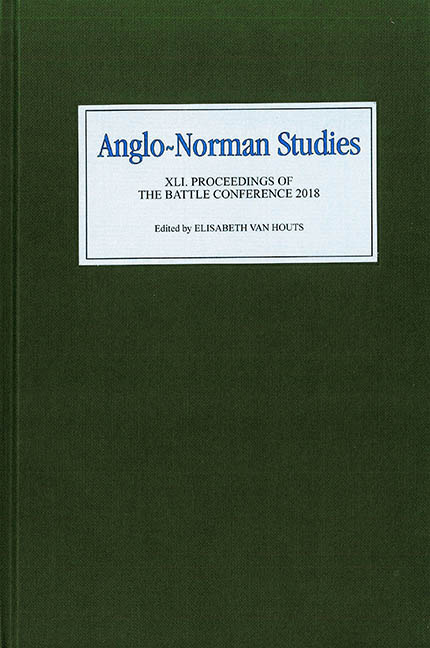Book contents
- Frontmatter
- Contents
- Illustrations and Tables
- Editor's Preface
- Abbreviations
- Horses, Knights and Tactics (The R. Allen Brown Memorial Lecture, 2018)
- Baldwin of Forde, Bartholomew of Exeter and the Authorship of the Liber de sectis hereticorum et orthodoxe fidei dogmata
- Evidence of the Ordinary: Wives and Children of the Clergy in Normandy and England, 1050–1150
- Anthropology, Feud and De obsessione Dunelmi
- New Archaeologies of the Norman Conquest
- An Angevin Imperial Context for the Amboise–Anjou Narrative Programme
- The Noble Leper: Responses to Leprosy in the Twelfth and Thirteenth Centuries
- Royal Taxation and Written Record in Eleventh-Century England and Ninth-Century West Francia
- Early Royal Rights in the Liberty of St Edmund (The Marjorie Chibnall Memorial Essay, 2018)
- Castle Construction, Conquest and Compensation (The Christine Mahany Memorial Lecture)
- Four Scenes from the Chanson de Roland on the Façade of Barletta Cathedral (Southern Italy)
- ‘The Jews are our Donkeys’: Anti-Jewish Polemic in Twelfth-Century French Vernacular Exegesis
- Miscellaneous Endmatter
Horses, Knights and Tactics (The R. Allen Brown Memorial Lecture, 2018)
Published online by Cambridge University Press: 29 March 2020
- Frontmatter
- Contents
- Illustrations and Tables
- Editor's Preface
- Abbreviations
- Horses, Knights and Tactics (The R. Allen Brown Memorial Lecture, 2018)
- Baldwin of Forde, Bartholomew of Exeter and the Authorship of the Liber de sectis hereticorum et orthodoxe fidei dogmata
- Evidence of the Ordinary: Wives and Children of the Clergy in Normandy and England, 1050–1150
- Anthropology, Feud and De obsessione Dunelmi
- New Archaeologies of the Norman Conquest
- An Angevin Imperial Context for the Amboise–Anjou Narrative Programme
- The Noble Leper: Responses to Leprosy in the Twelfth and Thirteenth Centuries
- Royal Taxation and Written Record in Eleventh-Century England and Ninth-Century West Francia
- Early Royal Rights in the Liberty of St Edmund (The Marjorie Chibnall Memorial Essay, 2018)
- Castle Construction, Conquest and Compensation (The Christine Mahany Memorial Lecture)
- Four Scenes from the Chanson de Roland on the Façade of Barletta Cathedral (Southern Italy)
- ‘The Jews are our Donkeys’: Anti-Jewish Polemic in Twelfth-Century French Vernacular Exegesis
- Miscellaneous Endmatter
Summary
Much has been written on the subject of warfare, knights and horses since I published on the small knightly holdings of late eleventh-century England in 1970. Since then, the interpretation of late Anglo-Saxon England as a functioning state with a competent fiscal and coinage network has won general acceptance. Those competences, of course, served only to heighten the attraction of the country to the militarily ambitious from overseas and within. The successful Normans utilized all possible avenues of Anglo-Saxon governance; however, the two regimes differed most visibly in the construction of castles, and so in one area at least, that of military organization.
Wide-ranging and nuanced studies of the knightly classes have appeared. And whilst it is not always easy to link the evidence and conclusions of specialist studies, several themes do recur. One is the indispensable role of ships and naval expertise in the late Anglo-Saxon military, and the list of Norman magnates who contributed ships for the invasion, now accepted to have an authentic origin, confirms the crucial part naval power played in Duke William's preparations within Normandy for conquest. Another is the importance of the Norman kings’ extended military household, providing ‘a well-trained and adequately paid professional military force’ for the command and garrisoning of royal castles, and enabling reaction from his forces in the field as a mounted corps d’élite.
Although horses have always featured picturesquely in the military story of the Norman conquest, their role remains surprisingly neglected in mainstream histories; yet the distance horses might normally travel, the power and protection they supplied, and the stresses of contemporary conditions on them were essential constituents of political decisions and military action. Exceptional were R. C. Smail's work on Crusading Warfare, which paid due attention to horse power, and Ralph Davis's wide-ranging and under-used works on the Norman horse. Somewhat more recently, realistic studies have been produced by Howard Clarke, John Gillingham and Andrew Ayton for Maurice Keen's Medieval Warfare; and substantial monographs by the equine expert Ann Hyland, and by the archaeological historian John Clark, have furthered our knowledge of the history of the horse. But their works are not yet fully integrated into the general perception of the eleventh and twelfth centuries.
- Type
- Chapter
- Information
- Anglo-Norman Studies XLIProceedings of the Battle Conference 2018, pp. 1 - 22Publisher: Boydell & BrewerPrint publication year: 2019



